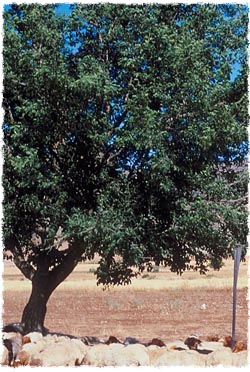
Tu B’Shevat: What and How
Farming Religiously
The 15th of Shevat is the New Year for Trees, known as Tu b’Shevat.
According to Biblical law, there is a seven year agricultural cycle, concluding with the Sabbatical year. When the Holy Temple stood in Jerusalem, on years one, two, four and five of this cycle, farmers were required to separate a tenth of their produce and eat it in Jerusalem. This tithe is called Maaser Sheni, the Second Tithe, because it is in addition to the (two percent which must be given to the Kohain, and the) ten percent which is given to the Levite. On the third and sixth years of the cycle, instead of the owners eating the Maaser Sheni in Jerusalem, they gave this second tithe to the poor, who were permitted to consume it wherever they wished.
It takes approximately four months for the rains of the new year to saturate the soil and trees, and produce fruit[On the Sabbatical year, no tithes are separated. All produce which grows during this year is ownerless and free for anyone to take.]
It was therefore of vital importance to ascertain when the new year started for produce. Our Rabbis established that a fruit which blossomed before the 15th of Shevat is produce of the previous year. If it blossomed afterwards, it is produce of the “new year.” [By comparison, grains, vegetables, and legumes have the same New Year as humans, the 1st of Tishrei.] Why is this so? In the Mediterranean region, the rainy season begins with the festival of Sukkot. It takes approximately four months (from Sukkot, the 15th of Tishrei, until the 15th of Shevat) for the rains of the new year to saturate the soil and trees, and produce fruit. All fruit which blossom beforehand are a product of the rains of the previous year, and are tithed together with the crops of the previous year.
Although this day is Rosh Hashanah for trees, we attach special significance to this holiday because “Man is [compared to] the tree of the field” (Deuteronomy 20:19). Through cultivating strong roots – faith and commitment to G?d – we produce many fruits—Torahand Mitzvot.
Observances and Customs
On this day it is customary to partake of the fruit with which the Holy Land is praised (Deuteronomy 8:8): olives, dates, grapes, figs and pomegranates. If tasting any of these fruit for the first time this season, remember to recite the Shehecheyanu blessing. (A blessing recited on joyous occasions, thanking G?d for “sustaining us and enabling us to reach this occasion.” This blessing is recited before the standard “Ha’etz” blessing recited on fruit.)
Due to the festive nature of the day, we omit the Tachanun sections (petitions for forgiveness and confession) from the prayers.

